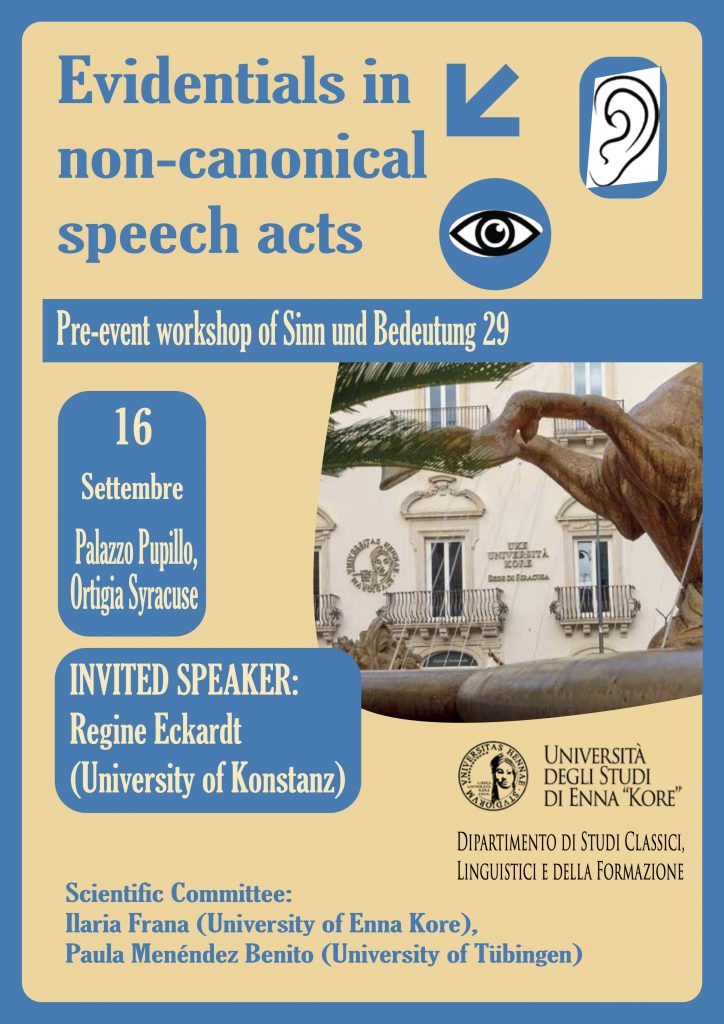the CONFERENCE and the WORKSHOPS







Sinn und Bedeutung 29
Sinn und Bedeutung 29 will feature a three-day main session (Sept. 17-19) with three plenary talks by Elena Pagliarini, Gennaro Chierchia, and Viola Schmitt, three parallel sessions with 30 minute talks plus 10 minutes for questions and two poster sessions.
The conference includes works in the fields of natural language semantics, pragmatics, the syntax-semantics interface, experimental semantics and pragmatics, neurosemantics and neuropragmatics, developmental semantics and pragmatics, computational semantics/pragmatics, super semantics, philosophy of language, and logic.
The conference program will be updated on this web site after June 15, 2024, as the selection of talks and posters will be finalized (stay tuned!)
Evidentials in non-canonical speech acts
INVITED SPEAKER Regine Eckardt (University of Konstanz)
ORGANIZERS Ilaria Frana (University of Enna “Kore”) and Paula Menendez Benito (University of Tuebingen)
DATE September 16, 2024
VENUE Palazzo Pupillo, Ortigia Syracuse, 96100 (SR)
CONTACT ilaria.frana@unikore.it
Over the last few decades, cross-linguistic research has yielded significant insights into the semantics of evidential markers, as illustrated by work on native American languages (see e.g., AnderBois 2019 for Mayan languages; Faller 2002 for Cuzco Quechua; Matthewson et al 2007 for St’á’imcets; Murray 2017 for Cheyenne), Asian languages (see e.g., Bhadra 2020 on Bangla; Garrett 2001 for Tibetan; Lim & Lee 2012 for Korean, McCready & Ogata 2007 for Japanese) and European languages (see e.g., Izvorski 1997 and Koev 2016 for Bulgarian; Faller 2007 and Schenner 2010 for German; Frana & Menéndez Benito 2023 for Italian).
A substantial part of this research highlights the role of evidentials in resetting default parameters associated with canonical assertions and questions, affecting the way they resulting speech act impacts the Common Ground (CG). In assertions, evidentials have been argued to perform non-negotiable updates to the CG (Murray 2017), to reset the default quality threshold normally required to put forward a proposition (Davis et al 2007) or to trigger a perspective shift along the lines of free indirect discourse (Faller 2019). In interrogatives, evidentials may give rise to conjectural questions which, unlike canonical questions, do not request an answer, but rather invite the addressee to engage in joint deliberation (Eckardt 2020). More recently, a new body of research has emerged that explores the interaction of evidentials and markers of non-canonical questions (see e.g., Korotkova 2016, Frana & Menéndez Benito 2019, Bhadra 2020). While still fragmentary, these studies already indicate that evidentials provide a good testing ground for investigating interactions between linguistic markers that trigger non-default CG updates.
The goal of this workshop is to contribute to our understanding of how evidentials help shape the CG by providing a forum for novel work investigating the use of evidential markers in non-canonical speech acts. We aim to bring together researchers employing a variety of theoretical and empirical methodologies (e.g., fieldwork, experimental or computational methods), and seek to discuss open issues and recent developments in this area of research. We particularly encourage submissions that provide insights arising from languages that are underrepresented in the previous literature.
The workshop will be hosted by the University of Enna “Kore”, as a satellite event of SuB 29.
Does semantics have a too many tools problem?
INVITED COMMENTATORS Gennaro Chierchia (Harvard) and Viola Schmitt (MIT / HU Berlin)
ORGANIZERS Andreea Nicolae (ZAS) and Uli Sauerland (ZAS)
DATE September 20, 2024
VENUE Noto, Sicily
CONTACT nicolae/sauerland@leibniz-zas.de
The dominant approach of formal semantic research over the last decades has been to formulate models of meaning within the typed lambda calculus. Two observations cause us to ask the question whether formal semantics has a too-many-tools (TMT) problem.
1) The formalism allows the expression of many concepts that seem to have overlapping empirical coverage such as variables, alternatives, choice-functions, logical duals with negation, and strenthening by exhaustification and lexically strong meanings.
2) Several crosslinguistic constraints on how specific meanings can be expressed such as conservativity, the adicity of predicates, the structures expressing questions, or the inventory of connectives are not explained within such models, and the accounts require appeal to other systems such as syntax or general cognition.
We seek contributions that address the TMT-question, i.e. whether semantics indeed has a TMT-problem. Specifically we welcome:
1) work that shows for specific semantic tools that their uses can overlap and draws consequences for the TMT-question
2) work that discusses one or multiple general constraints on the cross-linguistic expression of meaning in relation to the TMT-question
3) work that argues for or against possible approaches that avoid some TMT-problems in semantics
